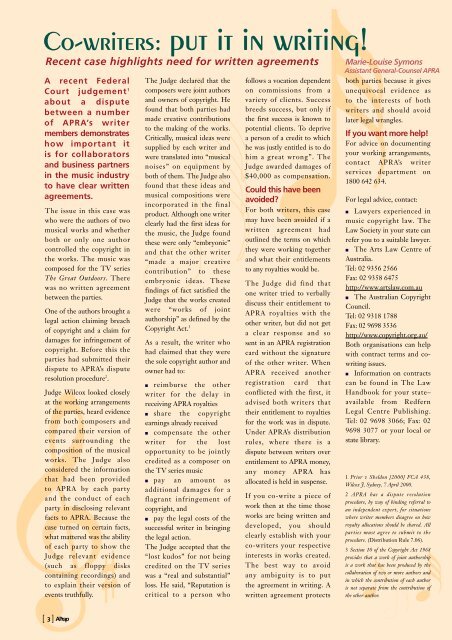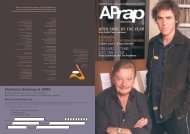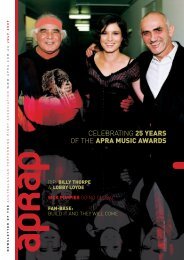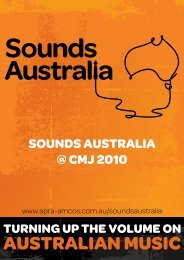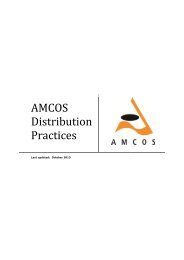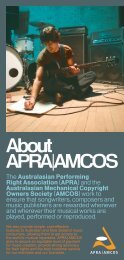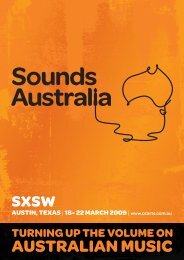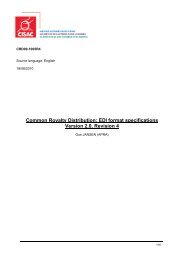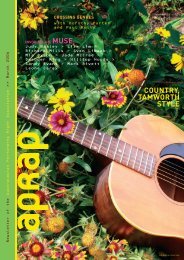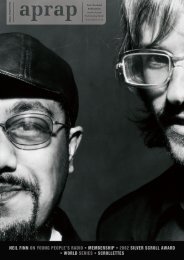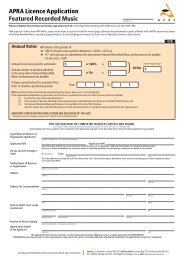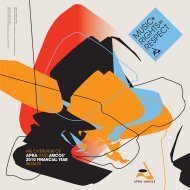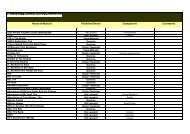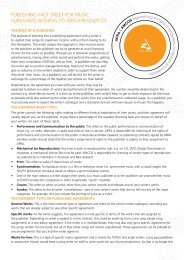Composers - APRA
Composers - APRA
Composers - APRA
Create successful ePaper yourself
Turn your PDF publications into a flip-book with our unique Google optimized e-Paper software.
Co-writers: put it in writing!<br />
Recent case highlights need for written agreements<br />
A recent Federal<br />
Court judgement 1<br />
about a dispute<br />
between a number<br />
of <strong>APRA</strong>’s writer<br />
members demonstrates<br />
how important it<br />
is for collaborators<br />
and business partners<br />
in the music industry<br />
to have clear written<br />
agreements.<br />
The issue in this case was<br />
who were the authors of two<br />
musical works and whether<br />
both or only one author<br />
controlled the copyright in<br />
the works. The music was<br />
composed for the TV series<br />
The Great Outdoors. There<br />
was no written agreement<br />
between the parties.<br />
One of the authors brought a<br />
legal action claiming breach<br />
of copyright and a claim for<br />
damages for infringement of<br />
copyright. Before this the<br />
parties had submitted their<br />
dispute to <strong>APRA</strong>’s dispute<br />
resolution procedure 2 .<br />
Judge Wilcox looked closely<br />
at the working arrangements<br />
of the parties, heard evidence<br />
from both composers and<br />
compared their version of<br />
events surrounding the<br />
composition of the musical<br />
works. The Judge also<br />
considered the information<br />
that had been provided<br />
to <strong>APRA</strong> by each party<br />
and the conduct of each<br />
party in disclosing relevant<br />
facts to <strong>APRA</strong>. Because the<br />
case turned on certain facts,<br />
what mattered was the ability<br />
of each party to show the<br />
Judge relevant evidence<br />
(such as floppy disks<br />
containing recordings) and<br />
to explain their version of<br />
events truthfully.<br />
The Judge declared that the<br />
composers were joint authors<br />
and owners of copyright. He<br />
found that both parties had<br />
made creative contributions<br />
to the making of the works.<br />
Critically, musical ideas were<br />
supplied by each writer and<br />
were translated into “musical<br />
noises” on equipment by<br />
both of them. The Judge also<br />
found that these ideas and<br />
musical compositions were<br />
incorporated in the final<br />
product. Although one writer<br />
clearly had the first ideas for<br />
the music, the Judge found<br />
these were only “embryonic”<br />
and that the other writer<br />
“made a major creative<br />
contribution” to these<br />
embryonic ideas. These<br />
findings of fact satisfied the<br />
Judge that the works created<br />
were “works of joint<br />
authorship” as defined by the<br />
Copyright Act. 3<br />
As a result, the writer who<br />
had claimed that they were<br />
the sole copyright author and<br />
owner had to:<br />
■ reimburse the other<br />
writer for the delay in<br />
receiving <strong>APRA</strong> royalties<br />
■ share the copyright<br />
earnings already received<br />
■ compensate the other<br />
writer for the lost<br />
opportunity to be jointly<br />
credited as a composer on<br />
the TV series music<br />
■ pay an amount as<br />
additional damages for a<br />
flagrant infringement of<br />
copyright, and<br />
■ pay the legal costs of the<br />
successful writer in bringing<br />
the legal action.<br />
The Judge accepted that the<br />
“lost kudos” for not being<br />
credited on the TV series<br />
was a “real and substantial”<br />
loss. He said, “Reputation is<br />
critical to a person who<br />
follows a vocation dependent<br />
on commissions from a<br />
variety of clients. Success<br />
breeds success, but only if<br />
the first success is known to<br />
potential clients. To deprive<br />
a person of a credit to which<br />
he was justly entitled is to do<br />
him a great wrong”. The<br />
Judge awarded damages of<br />
$40,000 as compensation.<br />
Could this have been<br />
avoided?<br />
For both writers, this case<br />
may have been avoided if a<br />
written agreement had<br />
outlined the terms on which<br />
they were working together<br />
and what their entitlements<br />
to any royalties would be.<br />
The Judge did find that<br />
one writer tried to verbally<br />
discuss their entitlement to<br />
<strong>APRA</strong> royalties with the<br />
other writer, but did not get<br />
a clear response and so<br />
sent in an <strong>APRA</strong> registration<br />
card without the signature<br />
of the other writer. When<br />
<strong>APRA</strong> received another<br />
registration card that<br />
conflicted with the first, it<br />
advised both writers that<br />
their entitlement to royalties<br />
for the work was in dispute.<br />
Under <strong>APRA</strong>’s distribution<br />
rules, where there is a<br />
dispute between writers over<br />
entitlement to <strong>APRA</strong> money,<br />
any money <strong>APRA</strong> has<br />
allocated is held in suspense.<br />
If you co-write a piece of<br />
work then at the time those<br />
works are being written and<br />
developed, you should<br />
clearly establish with your<br />
co-writers your respective<br />
interests in works created.<br />
The best way to avoid<br />
any ambiguity is to put<br />
the agreement in writing. A<br />
written agreement protects<br />
Marie-Louise Symons<br />
Assistant General-Counsel <strong>APRA</strong><br />
both parties because it gives<br />
unequivocal evidence as<br />
to the interests of both<br />
writers and should avoid<br />
later legal wrangles.<br />
If you want more help!<br />
For advice on documenting<br />
your working arrangements,<br />
contact <strong>APRA</strong>’s writer<br />
services department on<br />
1800 642 634.<br />
For legal advice, contact:<br />
■ Lawyers experienced in<br />
music copyright law. The<br />
Law Society in your state can<br />
refer you to a suitable lawyer.<br />
■ The Arts Law Centre of<br />
Australia.<br />
Tel: 02 9356 2566<br />
Fax: 02 9358 6475<br />
http://www.artslaw.com.au<br />
■ The Australian Copyright<br />
Council.<br />
Tel: 02 9318 1788<br />
Fax: 02 9698 3536<br />
http://www.copyright.org.au/<br />
Both organisations can help<br />
with contract terms and cowriting<br />
issues.<br />
■ Information on contracts<br />
can be found in The Law<br />
Handbook for your state–<br />
available from Redfern<br />
Legal Centre Publishing.<br />
Tel: 02 9698 3066; Fax: 02<br />
9698 3077 or your local or<br />
state library.<br />
1 Prior v Sheldon [2000] FCA 438,<br />
Wilcox J, Sydney, 7 April 2000.<br />
2 <strong>APRA</strong> has a dispute resolution<br />
procedure, by way of binding referral to<br />
an independent expert, for situations<br />
where writer members disagree on how<br />
royalty allocations should be shared. All<br />
parties must agree to submit to the<br />
procedure. (Distribution Rule 7.06).<br />
3 Section 10 of the Copyright Act 1968<br />
provides that a work of joint authorship<br />
is a work that has been produced by the<br />
collaboration of two or more authors and<br />
in which the contribution of each author<br />
is not separate from the contribution of<br />
the other author.<br />
[ 3]<br />
APrap


